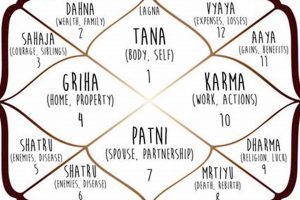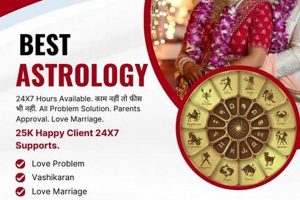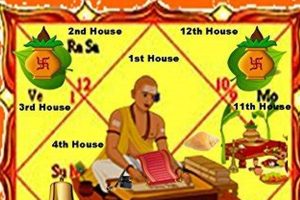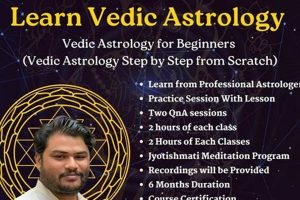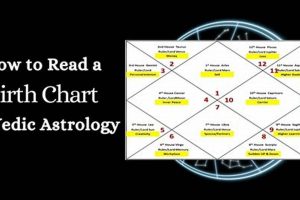Study programs focused on Jyotish, or Indian astrology, provide instruction in planetary positions, constellations (Nakshatras), and their perceived influence on human affairs. These structured learning experiences may cover predictive techniques, remedial measures (like gemstone recommendations), and the philosophical underpinnings of this ancient system. A typical curriculum might include the study of birth charts, divisional charts, planetary periods (dashas), and transits.
Learning this complex system offers practitioners a framework for self-understanding and navigating life’s challenges. Proponents suggest potential benefits include gaining insights into personality traits, relationships, career paths, and opportune timings for important decisions. Rooted in the Vedas, Jyotish holds a significant place in Indian culture and continues to be a source of guidance for many. Its historical relevance provides a rich backdrop for understanding its principles and applications in contemporary life.
This exploration will further delve into specific aspects of these educational programs, including curriculum variations, available formats (online, in-person), reputable institutions, and the skills one might acquire through dedicated study. It will also address the potential challenges and ethical considerations associated with the practice of Jyotish.
Tips for Approaching Jyotish Studies
Embarking on the study of Vedic astrology requires dedication, patience, and a discerning approach. These tips offer guidance for navigating the learning process effectively.
Tip 1: Establish a Strong Foundation: Begin with foundational texts and resources that cover basic concepts like the zodiac, planets, houses, and Nakshatras. A solid grasp of these fundamentals is crucial for more advanced study.
Tip 2: Find a Qualified Teacher: Seek guidance from experienced practitioners or reputable institutions offering structured learning programs. Personalized instruction can significantly enhance understanding and provide valuable insights.
Tip 3: Practice Chart Interpretation: Regularly analyze birth charts to develop interpretive skills. Start with self-analysis and gradually progress to interpreting charts of family and friends.
Tip 4: Study Classical Texts: Explore ancient scriptures like the Brihat Parashara Hora Shastra to gain a deeper understanding of the philosophical and theoretical underpinnings of Jyotish.
Tip 5: Develop Critical Thinking: Cultivate a discerning approach to applying astrological principles. Avoid fatalistic interpretations and encourage informed decision-making.
Tip 6: Embrace Continuous Learning: Jyotish is a vast and complex subject. Maintain a commitment to ongoing learning through advanced courses, workshops, and conferences.
Tip 7: Consider Ethical Implications: Understand the ethical responsibilities associated with astrological practice, emphasizing client well-being and responsible predictions.
By adhering to these guidelines, individuals pursuing the study of Vedic astrology can cultivate a deeper understanding of this intricate system and its potential applications. This structured approach promotes responsible practice and facilitates meaningful insights into the interplay of cosmic influences and human experience.
The following sections will explore further resources and opportunities for those interested in pursuing formal training in Vedic astrology.
1. Curriculum Depth
The depth of a Vedic astrology curriculum is paramount to acquiring a comprehensive understanding of this complex subject. A robust curriculum facilitates a layered learning experience, moving from foundational principles to advanced techniques, enabling effective practice and interpretation.
- Foundational Principles
A strong foundation covers the basics of the zodiac, planets, houses (bhavas), and constellations (Nakshatras). Understanding these elements forms the bedrock for interpreting birth charts and predictive techniques. For example, a solid grasp of planetary dignities and debilities is essential for assessing planetary strength in a chart. Without this foundational knowledge, accurate interpretation becomes challenging.
- Predictive Techniques
This facet delves into various predictive methods, including planetary periods (dashas), transits (gochara), and annual charts (Varshaphala). Each technique offers a unique lens for forecasting potential life events. Studying these techniques comparatively allows students to synthesize information from multiple perspectives. For instance, understanding how a planetary period interacts with a transit can provide a more nuanced prediction.
- Remedial Measures
Jyotish offers various remedies to mitigate challenging planetary influences. Curriculum depth in this area explores techniques like gemstone recommendations, mantra chanting, and charitable activities. Understanding the principles behind these remedies is crucial for ethical and effective application. For example, prescribing gemstones without considering the individual’s entire birth chart can be counterproductive.
- Philosophical and Ethical Considerations
A comprehensive curriculum also addresses the philosophical underpinnings of Jyotish, drawing from ancient texts and traditions. This includes understanding the concept of karma and the ethical implications of astrological practice. Integrating philosophy and ethics fosters responsible application and avoids deterministic predictions. For instance, understanding the limitations of astrological predictions and emphasizing free will is essential for ethical practice.
The depth of these curricular components equips aspiring astrologers with the knowledge and skills necessary for insightful chart interpretation and responsible practice. A well-rounded curriculum empowers individuals to apply Jyotish principles effectively, fostering self-awareness and informed decision-making while upholding ethical considerations.
2. Instructor Credentials
The credibility and effectiveness of Vedic astrology courses are significantly influenced by the instructor’s credentials. Expertise in Jyotish requires in-depth knowledge, practical experience, and a commitment to ethical practice. Assessing instructor qualifications is essential for prospective students seeking authentic and valuable learning experiences. The following facets offer a framework for evaluating instructor credentials.
- Traditional Lineage and Guru-Shishya Parampara
Traditional Vedic astrology often emphasizes lineage and the Guru-Shishya Parampara (teacher-student tradition). Learning from a teacher within a recognized lineage can provide valuable insights into traditional methods and interpretations passed down through generations. While lineage can be a valuable indicator, it’s crucial to consider other credentials alongside lineage to ensure comprehensive expertise. For example, a teacher within a respected lineage who also holds advanced certifications and demonstrates practical experience offers a robust combination of traditional and contemporary knowledge.
- Formal Education and Certifications
Formal education in Jyotish from recognized institutions demonstrates a structured learning path and commitment to the subject. Certifications from reputable organizations signify adherence to specific standards and a level of proficiency in astrological principles. For example, a certification in predictive astrology from a renowned Vedic astrology institute indicates specialized training in forecasting techniques. These qualifications provide a measurable assessment of an instructor’s knowledge and skills.
- Practical Experience and Chart Interpretation Skills
Years of practical experience in chart interpretation are crucial for developing nuanced understanding and predictive accuracy. An experienced astrologer has encountered diverse chart patterns and life situations, honing their ability to synthesize information and provide meaningful insights. For example, an instructor with a decade of experience in client consultations likely possesses a deeper understanding of how astrological principles manifest in real-life scenarios, offering valuable practical guidance to students.
- Ethical Conduct and Professional Reputation
Ethical conduct and a strong professional reputation are essential for responsible astrological practice. Instructors should adhere to ethical guidelines, emphasizing client well-being and avoiding deterministic predictions. A positive reputation within the astrological community signifies adherence to ethical principles and professional integrity. Student testimonials and peer reviews can offer insights into an instructor’s ethical approach and overall professionalism. For example, an instructor known for their empathetic approach to consultations and their commitment to client empowerment fosters a positive learning environment and instills ethical values in students.
These combined facets offer a comprehensive perspective on evaluating instructor credentials in Vedic astrology courses. By considering lineage, formal education, practical experience, and ethical conduct, prospective students can make informed decisions and choose instructors who provide authentic and valuable learning experiences, promoting responsible practice and a deeper understanding of Jyotish.
3. Teaching Methodology
The effectiveness of Vedic astrology courses hinges significantly on the teaching methodology employed. A well-structured approach facilitates comprehension of complex concepts, fosters practical application, and cultivates critical thinking. Exploring various teaching methodologies reveals their distinct contributions to the learning process within Jyotish education.
- Interactive Instruction
Interactive instruction moves beyond passive lectures, encouraging student participation through discussions, question-and-answer sessions, and group activities. This approach fosters active learning, allowing students to clarify doubts, share perspectives, and engage directly with the material. For example, analyzing birth charts collectively in a group setting provides opportunities for peer learning and diverse interpretations, enriching the learning experience.
- Case Study Analysis
Case study analysis provides practical application of theoretical concepts. Examining real-life birth charts and exploring life events through the lens of Jyotish principles strengthens interpretive skills and demonstrates the practical relevance of astrological techniques. Analyzing historical figures’ charts, for instance, allows students to connect astrological patterns with historical events, deepening understanding and critical analysis.
- Blended Learning Approaches
Blended learning combines online resources with traditional classroom instruction. Online modules offer flexibility and accessibility, while in-person sessions provide personalized guidance and interactive learning opportunities. This blended approach caters to diverse learning styles and schedules, enhancing the learning experience. For example, online lectures can provide foundational knowledge, while in-person workshops focus on practical chart interpretation and personalized feedback.
- Personalized Mentoring and Guidance
Personalized mentoring provides individual attention and tailored guidance to address specific learning needs. One-on-one sessions with experienced astrologers offer opportunities to refine interpretive skills, receive personalized feedback on chart analysis, and discuss complex astrological concepts in greater depth. This individualized approach fosters deeper understanding and accelerates skill development.
These diverse teaching methodologies contribute significantly to the effectiveness of Vedic astrology courses. By incorporating interactive instruction, case studies, blended learning, and personalized mentoring, educational programs create a rich learning environment that fosters comprehensive understanding, practical application, and critical thinking, empowering students to navigate the complexities of Jyotish effectively.
4. Practical Application
Practical application forms the cornerstone of effective Vedic astrology education. Bridging theoretical knowledge with real-world scenarios is crucial for developing interpretive skills and fostering a nuanced understanding of Jyotish principles. This section explores key facets of practical application within Vedic astrology courses.
- Chart Interpretation Exercises
Regular chart interpretation exercises provide opportunities to apply learned concepts to diverse birth charts. Analyzing charts of individuals with varying backgrounds, life experiences, and astrological combinations strengthens analytical skills and cultivates pattern recognition. For instance, comparing charts of individuals pursuing different career paths can illuminate the influence of planetary placements on professional choices. These exercises build confidence in applying theoretical knowledge to practical scenarios, fostering interpretive proficiency.
- Predictive Technique Application
Applying predictive techniques like planetary periods (dashas) and transits (gochara) to real-life scenarios hones forecasting skills. Analyzing past events in conjunction with astrological transits helps students understand how planetary movements correlate with life experiences, improving predictive accuracy and interpretive depth. For example, examining a past period of significant change in someone’s life and correlating it with corresponding transits provides valuable insights into the practical application of predictive techniques.
- Client Consultation Simulations
Simulated client consultations offer a safe environment to practice communication skills and ethical considerations within the context of astrological counseling. Role-playing scenarios allow students to navigate complex client situations, address sensitive questions, and practice delivering astrological insights with empathy and clarity. This prepares students for real-world consultations, emphasizing ethical conduct and effective communication.
- Remedial Measure Application
Understanding the practical application of remedial measures, such as gemstone recommendations and mantra chanting, requires careful consideration of individual birth charts and ethical implications. Case studies and practical exercises focusing on remedy selection provide valuable insights into appropriate application and potential outcomes. For example, exploring the rationale behind recommending specific gemstones based on planetary placements and individual needs equips students with the knowledge to offer responsible and personalized guidance.
These practical applications are essential components of Vedic astrology courses, bridging theory and practice. By engaging in chart interpretation exercises, applying predictive techniques, simulating client consultations, and exploring remedial measures, students cultivate a deeper understanding of Jyotish, develop practical skills, and foster ethical conduct, preparing them for responsible and insightful astrological practice.
5. Ethical Considerations
Ethical considerations are paramount within Vedic astrology courses, shaping responsible practice and fostering client well-being. Integrating ethical principles into educational programs cultivates integrity and professionalism within the field, ensuring that astrological knowledge is applied judiciously and with sensitivity. This exploration delves into key ethical facets relevant to Jyotish education.
- Client Confidentiality
Maintaining client confidentiality is fundamental to ethical astrological practice. Information shared during consultations must be treated with utmost discretion and respect. Educational programs should emphasize the importance of privacy and data protection, ensuring that students understand their ethical obligations to safeguard client information. For example, disclosing personal details or astrological insights without client consent is a breach of ethical conduct, potentially causing harm and eroding trust. Respecting confidentiality builds a strong client-astrologer relationship based on trust and integrity.
- Avoiding Deterministic Predictions
Vedic astrology offers insights into potential life paths, but it’s crucial to avoid deterministic predictions. Framing astrological insights as probabilities rather than certainties empowers clients to exercise free will and make informed decisions. Educational programs should emphasize the limitations of astrological predictions and encourage students to present information responsibly, avoiding fatalistic pronouncements. For instance, suggesting that a specific event is inevitable can create undue anxiety and disempower clients. Emphasizing free will and personal agency promotes a balanced and empowering approach to astrological guidance.
- Scope of Practice
Recognizing the scope of astrological practice is essential for ethical conduct. Astrologers should refrain from offering advice beyond their expertise, such as medical or legal counsel. Educational programs should clearly define the boundaries of astrological practice, encouraging students to refer clients to appropriate professionals when necessary. For example, an astrologer noticing health indicators in a birth chart should recommend consulting a medical professional rather than offering medical advice directly. Respecting professional boundaries ensures that clients receive appropriate guidance and support from qualified experts.
- Financial Transparency
Maintaining financial transparency builds trust and fosters ethical practice. Clearly communicating consultation fees and payment policies ensures that clients are fully informed about financial arrangements. Educational programs should address financial ethics within astrological practice, encouraging transparency and fair practices. For example, disclosing all fees upfront and avoiding hidden charges demonstrates integrity and fosters a professional client-astrologer relationship built on trust and mutual respect.
These ethical considerations are integral to responsible Vedic astrology practice. Integrating these principles into educational programs equips aspiring astrologers with the ethical framework necessary to navigate complex client situations, build trusting relationships, and apply astrological knowledge with integrity and professionalism. By upholding ethical standards, practitioners contribute to the positive development and perception of Jyotish within the broader community. Furthermore, continued discussion and refinement of ethical guidelines within the field are essential to adapt to evolving societal norms and maintain the highest standards of professional conduct.
Frequently Asked Questions about Vedic Astrology Studies
This section addresses common inquiries regarding Vedic astrology educational programs, providing clarity for those considering this field of study.
Question 1: What is the typical duration of a Vedic astrology course?
Program lengths vary depending on the depth of study and specific curriculum. Foundational courses might span several months, while advanced programs can extend over several years. Diploma and certification programs often require a more substantial time commitment.
Question 2: Are online Vedic astrology courses as effective as in-person programs?
Online courses offer flexibility and accessibility, while in-person programs provide direct interaction with instructors and peers. The effectiveness of either format depends on individual learning preferences and the quality of the program itself. Blended learning models often combine the advantages of both formats.
Question 3: How can one discern the credibility of a Vedic astrology institution or teacher?
Evaluating instructor credentials, including lineage, formal education, practical experience, and ethical conduct, offers insights into credibility. Researching institutional affiliations, student testimonials, and industry recognition also contributes to informed decision-making.
Question 4: What is the difference between Vedic astrology and Western astrology?
Vedic astrology, rooted in ancient Indian scriptures, utilizes a sidereal zodiac based on the fixed positions of constellations. Western astrology typically employs a tropical zodiac based on the Sun’s apparent position relative to the Earth. These differing zodiacs result in variations in planetary placements and interpretations.
Question 5: Is prior knowledge of astrology required to enroll in a Vedic astrology course?
Many introductory courses cater to beginners with no prior astrological knowledge. However, some intermediate and advanced programs may require foundational understanding of basic astrological concepts.
Question 6: How can one apply the knowledge gained from a Vedic astrology course?
Applications vary from self-development and personal growth to professional astrological counseling. Some individuals utilize Jyotish principles for personal decision-making, while others pursue careers as astrological consultants, researchers, or educators.
Careful consideration of these frequently asked questions provides prospective students with a clearer understanding of Vedic astrology educational paths. Further research and exploration of individual learning goals are encouraged to make informed decisions aligned with personal aspirations.
The following sections will delve into specific resources and recommendations for pursuing Vedic astrology studies.
Conclusion
Exploration of structured learning programs in Vedic astrology reveals a multifaceted field encompassing curriculum depth, instructor credentials, teaching methodologies, practical application, and ethical considerations. A rigorous curriculum, combined with experienced instructors and effective pedagogical approaches, equips aspiring practitioners with the necessary tools for insightful chart interpretation and responsible application of Jyotish principles. Emphasis on practical application through chart analysis, predictive techniques, and simulated consultations bridges theoretical knowledge with real-world scenarios, fostering interpretive proficiency and ethical conduct.
The continued study and application of Vedic astrology offer profound potential for self-understanding, informed decision-making, and navigating life’s complexities. However, the ethical implications of astrological practice necessitate careful consideration and responsible application. Further research and exploration of available educational resources are encouraged for those seeking to deepen their understanding and embark on a path of learning within this ancient and intricate system of knowledge.


